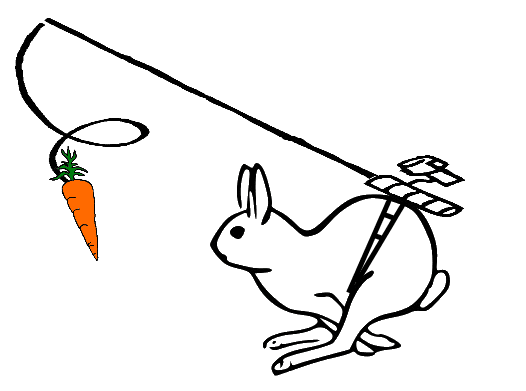
Chasing the Carrot is Killing Your Career
Professional success is not a hop, skip and a jump. It’s a steady climb. If you’re hopping here and there – from one job to the next – you’re doing it wrong. You may not realize it, but chasing the carrot is killing your career.
Job hopping is a trend, especially among younger workers, that is at epic proportions. What’s considered a hop? It’s staying less than two years in a position and then moving on. Labor research shows 64% of U.S. employees think job hopping is OK. In fact, it seems it’s considered more than OK – it’s actually viewed as a good thing. That’s unless you’re an employer.
There’s a belief that moving jobs is the fastest and easiest way to make more money and climb the career ladder. However, after a couple of hops – the opposite is true. Your resume reads choppy and you’re seen as a high risk for employers.
On average, it takes about six months to fully on-board a new hire and have that person trained and assimilated into a firm’s processes and procedures. When a manager sees a resume which shows a person changes jobs every year or two – they see a red flag. The risk is too high and the cost is too great for a company to spend money and time to train someone only to have them leave a short while later.
Too Bad, So Sad
Employers are taking a hard pass on candidates who’ve done the bunny-hop with their career. Not only are these candidates seen as a waste of time and training, but it has been shown that these individuals also don’t have the depth of skills necessary for success. In the long run, hoppers are losing to the steady, stable planners who show experience and dependability on their resume.
The Money Pit
To make career strides, you need to make well-planned career moves. Taking a job solely based on money will land you in a hole which will be hard to escape. How? Well, most likely, you’ll be missing key aspects of professional development. Staying in one position for a span of several years allows you to cultivate hard and soft skills. It gives you time to deep-dive into acquiring much needed knowledge and understanding as well as gaining teamwork, communication and leadership skills. Perseverance and tenacity are two highly valued soft skills that job hoppers often lack.
The 40% Rule
A well-planned career move should follow the 40% Rule. At least 40% of the new position should have non-monetary value. Each new position should offer a combination of elements such as more responsibility, better mentor(s), more interesting/challenging work, greater exposure to new and different aspects of your field, new clients and increased professional growth and learning. If a position doesn’t add up – pass.
I don’t mean to suggest that you stay put for 30 years in the same firm. Change and new opportunities are needed and valuable. However, slow the go. Plan your career moves wisely. The cash may call your name, but professional success and satisfaction will pass you by.
Career Wellness
Interested in more career nutrition? Check out the Career Wellness section of the SterlingFreeman website.
Seeking a new Public Accounting opportunity? SterlingFreeman recruits exclusively for Public Accounting. View our full list of premier public accounting positions nationwide. And connect with me on LinkedIn.
